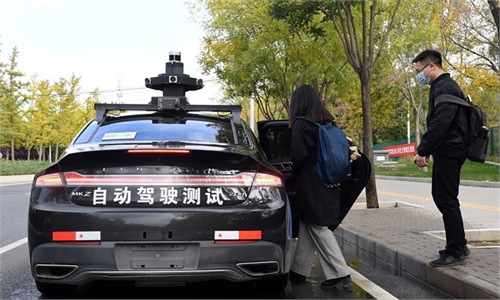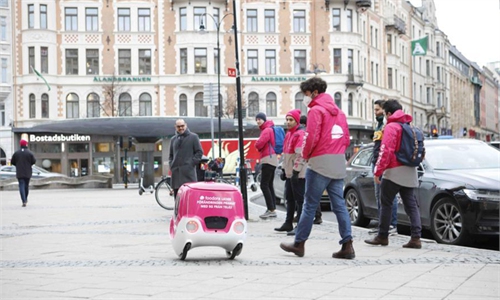Vehicle makers in drive to raise funds
Sea change in transportation sector brings wave of IPOs

A concept image of a self-driving vehicle powered by artificial intelligence Illustration: VCG
Self-driving truck start-up TuSimple Holdings Inc filed for a US IPO on Tuesday, joining a clutch of companies that are looking to capitalize on rising investor interest in the sector.
The company did not disclose the number of shares it plans to offer or the price range for its offering.
Dozens of start-ups, automakers, and large technology companies, including Google's Waymo and China-based Xpeng Inc, are accelerating work on self-driving car systems to cash in on the technology, which is expected to bring a sea change in the transportation industry.
Other self-driving companies such as Velodyne, Luminar Technologies and Aeva have also recently filed to go public, banking on a historic boom in US capital markets.
Companies raised roughly $167 billion through IPOs in 2020, according to Dealogic - a record that might be eclipsed again this year, according to investment bankers.
Self-driving trucks
California-based TuSimple, backed by Volkswagen's commercial trucking unit TRATON SE and United Parcel Service Inc, is developing self-driving trucks with Navistar International Corp, with production scheduled to start in 2024.
It launched a self-driving freight network partnership with UPS and Berkshire Hathaway Inc's supply chain unit, McLane, in July that it said should be operational nationwide by 2024.
Founded in 2015, TuSimple was under the scanner of the Committee on Foreign Investment in the US due to its ties with China, the Wall Street Journal reported earlier.
Autonomous trucking company TuSimple Inc, which gained momentum with hundreds of millions of dollars in financing from Chinese investors and US freight-hauling companies, has filed paperwork to go public and plans to join the US stock market as early as March, the Wall Street Journal reported in February citing people familiar with the matter.
But the committee did not pursue any action against the company.
TuSimple's revenue more than doubled to $1.8 million in 2020. The net loss widened to $198.8 million from $145 million a year earlier.
According to the Wall Street Journal, TuSimple said it raised $215 million in a 2019 financing round that valued it at $1.2 billion. It has since raised more capital.
Morgan Stanley, Citigroup and J.P. Morgan are the lead underwriters for the offering.
Other automakers are also seeking funds on different markets.
Hong Kong revs up
Hong Kong's bourse is revving up to join the electric-vehicle race. China's Tesla wannabes have so far favored New York to charge up on capital. But now three of them - Nio, Li Auto, and Xpeng - may drive closer to home to raise some $6.1 billion in total. That could prompt others to follow.
Nio is now worth $70 billion, 10 times its market value at the time of its 2018 IPO on the New York Stock Exchange. The company run by William Li, along with Li Auto and Xpeng, which listed in 2020, have together raised almost $15 billion in US markets over the past three years.
Hong Kong is uncharted territory for electric-vehicle upstarts. Its investors are more familiar with legacy automakers such as Brilliance China Automotive and Great Wall Motor than the brave new world of batteries and chargers. The closest thing to Nio and its peers is electric-car and battery maker BYD, a more mature marque that entered the auto business in 2003, or property conglomerate Evergrande's experimental investments in the sector.
That could change. Last year, nine US-listed Chinese companies used the city's bourse to raise close to $17 billion, according to KPMG. For instance, Baidu raised more than $3 billion in a secondary listing on Tuesday. This suggests the market could easily meet the needs of Nio, Li Auto and Xpeng.
There's plenty of demand for cash now. Battery-power entrepreneurs have been speeding into global markets, and they may soon be joined by traditional automakers spinning off their own electric-vehicle units.
If a triple whammy of electric-car start-ups can power up successfully in Hong Kong, plenty more companies will join in.



